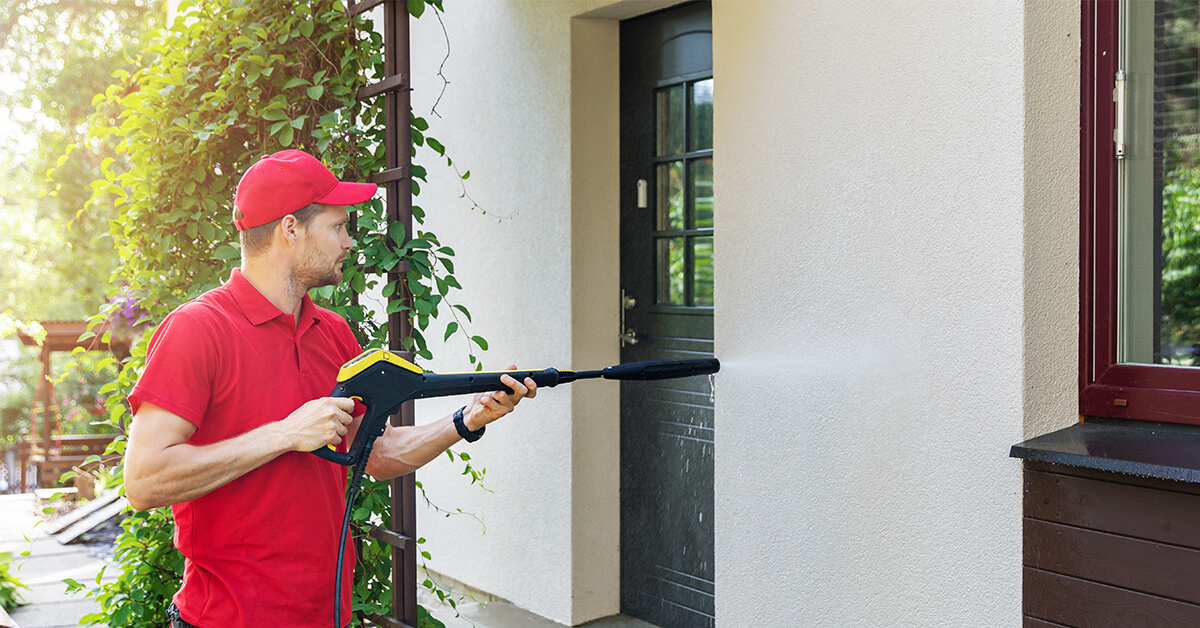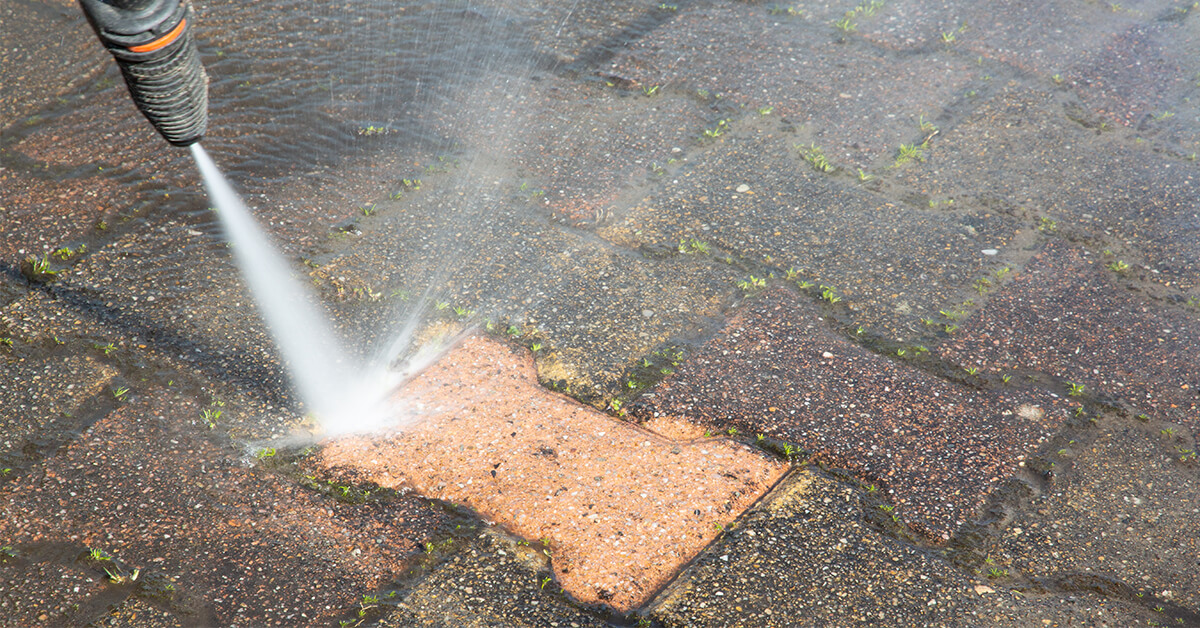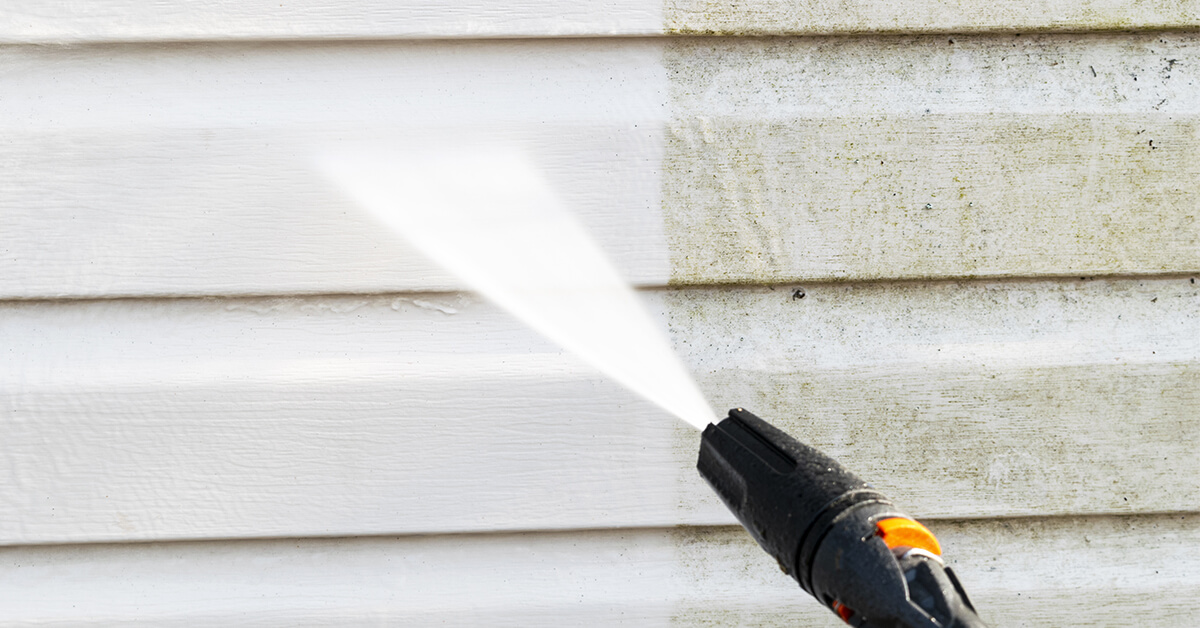Pressure washers are a lifesaver (and back saver) when it comes to cleaning caked-on debris from your gutters.
Finding the ideal pressure washer for your weekend project is simple when you know precisely what you’re looking for. Otherwise, you may end up overspending or realizing halfway through a project that you can’t finish the job.
Before purchasing a pressure washer for gutter cleaning, there are four essential questions to ask yourself. This article will review all the crucial information you need to know before you get your project started.
How to Find the Best Pressure Washer for Gutter Cleaning
Before gutter cleaning, there are some basics that everyone stepping on a ladder should know. Knowing the difference between a pressure washer vs. a power washer and what additional equipment you need is a great first step.
At Excel Residential Services, we’ve worked with clients from all around the Northeast that have switched from pressure washing to power washing for gutter cleaning and other property maintenance. The difference between pressure washing and power washing is that power washing uses hot water. Depending on the project and surface you’re working with, hot water can be an added benefit to getting the job done faster and more effectively.
Before starting your gutter cleaning projects, you should also have professional-grade safety equipment such as goggles, gloves, and a filtered breathing mask. This safety equipment helps prevent bacterial infections such as Legionnaires’ disease from the standing water in your gutters.
If you’re curious about power washing on your property and you live in the Mid-Atlantic part of the United States, reach out for a free quote to get started. Meanwhile, let’s hop into answering your questions.
The 4 Questions to Ask Before Buying A Pressure Washer
Pressure washing equipment costs hundreds of dollars upfront, not counting the extra cleaning accessories and safety equipment needed. Making the right purchase will save time, money, and frustration moving forward.
Here are the four essential questions to ask before purchasing your new pressure washer:
- How much power do I need?
- How long do I want this equipment to last?
- What surfaces and jobs will I be using this for, besides gutter cleaning?
- Should I get a gas or electric pressure washer?
1. Finding A Powerful Pressure Washer
There are several ways to measure the power of your pressure washer, including gallons per minute (GPM), horsepower (HP), pound per square inch (PSI), and cleaning power units (CPU).
Gallons per minute (GPM) measures the amount of water produced by the pressure washer. On average, pressure washers will run about eight gallons of water per minute. For light gutter cleaning, the lower the GPM, the better. The minimum for gutter cleaning is 1.2 GPM, but the standard is 5 GPM for the average machine.
Horsepower (HP) directly determines how much power the machine has to work with. Typically the higher the horsepower, the greater the cleaning ability. This means that the higher the horsepower your machine has, the more water pressure and water volume you will have. When deciding on horsepower, it’s essential to stick with the more well-known brands like Briggs & Stratton, Honda, and Kohler, with a minimum of 5 HP for gutter cleaning. Professionals use a minimum of 6.5 HP for various projects homeowners need assistance with, such as sidewalks, cement, roof, and other debris cleaning. Pressure washers can also go as high as 30 HP, which are meant for heavy-duty jobs such as trailer truck cleaning.
Pound per square inch (PSI) refers to the pressure generated by the pressure washer per square inch of the surface being cleaned. The PSI is what makes pressure washers adjustable. It’s best practice to use a relatively low PSI setting like 500-1500 PSI when working on your gutters, along with different attachments to change the size of the jetstream. PSI can go up to 3,500 in some models, but up to 1900 PSI qualifies as light duty.
Cleaning Power Units (CPU) is a helpful metric when comparing different pressure washer models to quantify the washer’s ability to clean. The higher the CPU, the better the pressure washer is at deep cleaning. CPU measurements are calculated by multiplying the PSI x GPM. Usually, PSI measurements are more significant than CPU measurements, but we recommend a minimum of 5400 CPU - ideally 8000 CPU. Pressure washers under 6000 CPU can eventually get the job done after several passes, while over 7000 CPU is enough to only need one pass.
2. Calculating Equipment Durability
The size of a pressure washer gives you a good idea of how long it would take to complete any particular job and how many jobs you can do in a day. If your only project is light gutter cleaning 2-4 times per year, then a lower-cost pressure washer should last you until 100 hours of use. We recommend using a higher quality pressure washer that lasts around 500 hours for more heavy-duty gutter cleaning or use on other surfaces.
Depending on how often you use your pressure washer will determine how many years your system lasts. The average household uses their pressure washer for 50 hours per year. For example, if you’re working on your gutters for 4 hours every few months, then your pressure washer can last anywhere from 5+ years without any maintenance issues. Common issues that decrease the lifespan of your pressure washer include cavitation, overheating, and unloader valve problems.
3. Choosing the Right Pressure Washer for Your Surfaces
How tough are the upcoming gutter cleaning projects you have coming up? Are you going to use your pressure washer for other projects?
For instance, a 2000 PSI pressure washer is enough to clean your gutters, wash down the cars, or clean the deck, but what happens if you have a tougher job like the walkways, steps, and stones. A low PSI pressure washer wouldn’t be nearly as effective.
This is where choosing between an industrial pressure washer and a residential pressure washer is crucial. The big drawback with residential pressure washers is that even though they may be more affordable, anything beyond light cleaning tasks will most likely require extra passes to get the job done.
Our technicians at Excel Residential Services use industrial power washers with heated water to get that extra bit of cleaning power when needed. Suppose you need to take care of big projects around your property, in addition to gutter cleaning. In that case, the cost of industrial pressure washers is worth weighing the benefits of using a professional power washing service.
4. Gas vs. Electric Pressure Washers
Price Comparisons
When it comes down to price, electric pressure washers are more affordable solutions. Gas pressure washers, on the other hand, are more cost-effective in the long run. Electric pressure washers cost $150-400 on average, while gas pressure washers cost $250-1,000+ on average.
Motor Comparisons
The motor of an electric power washer can be seen as an advantage because these systems often require less maintenance and are much quieter. Alternatively, gas pressure washers often have a more high-powered engine that is versatile for light or heavy-duty projects like gutter cleaning.
Lifespan Comparisons
The lifespan of electric pressure washers isn’t anywhere close to what you get from your average gas pressure washer. Overusing your electric pressure washer will cause you to end up incurring surprise costs, such as expensive part replacements. Alternatively, gas-powered engines use high-quality metal components and pumps that are easily replaceable. In general, gas-powered pressure washers are estimated to last for many years with the proper use, care, and maintenance.
The Best Way to Get Perfect Gutter Cleaning Results Every Time
Now that we’ve shown you how to choose the best pressure washer for gutter cleaning, let’s explore one more topic. Gutter cleaning is a tremendous job to take on by yourself, especially when you have several impactful decisions to make. There are many moving parts to worry about between deciding which pressure washer to choose, which chemicals to use, if any, what safety equipment to buy, and which attachments to choose.
At Excel Residential Services, we use a power washer to get all the benefits of a pressure washer, but with the added option of heated water. We have all the essential equipment ready to go, and our technicians are trained to spot potentially costly gutter issues. Our cleaning experts are trained to detect potential damage on roofs and gutters, so you’re able to catch rot, mold, mildew, moss, leakage, and other damage early on.
Request a free quote to see how much gutter cleaning would be for you. Excel Residential Services serves the Mid-Atlantic area of the United States, and we are happy to help keep up your home maintenance.




